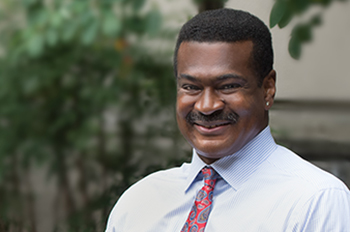By Angelo McClain, PhD, LICSW

Coronavirus and the unprecedented shutdown of the economy exposed the social and racial walls that make our society painfully unequal. The suspension of normalcy created space for a vast reconsideration of race, class and history. It is no longer possible to ignore that it’s harder to be Black, Brown or Indigenous in America.
The unfinished business the pandemic exposed provides an opportunity for a reckoning. We’ve had national reckonings on race—in the 1860s and 1960s and other points along the way—but we never got our justice. Denial of racial justice has been part of history again and again. How and whom America leaves behind has its roots in policies and practices grounded in racial decision-making—a continuous “through-line” of devaluing Black, Brown and Indigenous life, talent and ambition.
People ask us how we’re doing, not realizing how much we push down every day in order to function. Truthfully, we are not doing well. We feel deeply our unmet cry for the fullness of humanity and citizenship. There’s a kind of curse of being Black, Brown or Indigenous in this country: You are presumed to be guilty, to be dangerous, and you never know if the thing that went sideways in your life is due to race.
The new year represents a window of opportunity for healing and recapturing a sense of community—a sense that we all have a stake in each other’s dreams, struggles and lives, and that we are responsible for and need each other. As we strive to achieve racial equity and sustainable peace, we must understand that healing begins with common ground. Progress can be made by building community, setting aside our differences, and turning to each other rather than turning on each other.
Social workers know the statistics that show how racism continues to manifest itself through poverty and violence, red-lining in real estate, lower funding of predominantly Black schools, mass incarceration and other factors that prevent Black, Brown and Indigenous people from achieving the same levels of success as white people.
In 2021, there’s opportunity for social workers to transform the way America deals with racism and conflict. We have the skills to work with all sides, providing the tools needed to find solutions together. We have the relationships and abilities needed to convince the reluctant and fearful that social justice is not a limited resource: “If I get more, you don’t get less.”
Social workers must collectively reckon with the lingering impact segregation, colonization and structured inequality has on our profession, recommending approaches to make it more equitable. I look forward to working with colleagues as we lead the way in building mutually respectful relationships across racial lines that honor and value each person’s humanity.
Contact Angelo McClain at naswceo@socialworkers.org